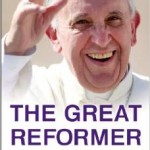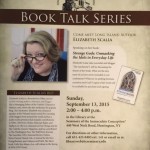Reflecting on Lumen Fidei over at First Things, Nathaniel Peters writes:
. . .an unexpected word does appear in Lumen Fidei: idolatry. As is characteristic of his evangelical boldness, Francis notes that in the story of the golden calf, “the opposite of faith is shown to be idolatry.” Faith demands a kind of patience. It requires us to abide the hiddenness of the God we long to see. The pope notes Martin Buber’s definition of idolatry, which he in turn took from the rabbi of Kock: “Idolatry is ‘when a face addresses a face which is not a face.’” Idolatry takes place when we refuse to abandon ourselves to God, when we look at a faceless thing that we can grasp instead of the face of God which sometimes remains invisible. The pope writes,
[Idols exist] as a pretext for setting ourselves at the centre of reality and worshiping the work of our own hands. Once man has lost the fundamental orientation which unifies his existence, he breaks down into the multiplicity of his desires; in refusing to await the time of promise, his life-story disintegrates into a myriad of unconnected instants. Idolatry, then, is always polytheism, an aimless passing from one lord to another. Idolatry does not offer a journey but rather a plethora of paths leading nowhere and forming a vast labyrinth.
Sin and idolatry fragment us. They keep us from living whole, integrated lives. When our hearts do not have the one who is the Good itself at their center, we run hither and thither pursuing lesser goods. Freed from obedience to a higher law, we become slaves of our own whims and desires. We buy more stuff. We trade sexual partners like cards and then drink to cover the pain. We harbor jealousies against our co-workers. We kill the inconvenient. We forget the poor.
Faith, on the other hand, grounds us. It gives us the lenses through which we see the world rightly and thereby begins to put our desires back in order. Faith frees us from the tyranny of self-mastery. Francis continues: “Herein lies the paradox: by constantly turning towards the Lord, we discover a sure path which liberates us from the dissolution imposed upon us by idols.”
It’s a really good piece, so you’ll want to read it all.
We are every one of us idolators. We create idols every single day. Have you ever brought this failing of the first commandment into the confessional? I confess, I did it for the first time while writing Strange Gods, when the truth of it hit be between the eyes: I was habitually breaking the first and most fundamental commandment. Very likely, so are you. I was struck by this review of the book, at Amazon:
I found nothing to dislike. The author’s illustrations were frightening because my own idol worship was illustrated. I also could see the same tendencies in all those around me. Especially in politic and in fact both political views I passionately held. Political ideologies both on the right and the left are caught up in idol worship.
As a 71-year-old, and former prosecutor of 20 years and family lawyer for 18 years, my working history was covered by many of the examples in her book, both of myself and the subject of numerous lawsuits I was involved in. I am ready to say that the root problem of America today is idol worship.
Emphasis mine. I think perhaps Pope Francis believes it to be true, too, because he certainly hits the theme with striking regularity and forthright speech.
“It’s not enough to say: ‘But I believe in God, God is the only God.’ That’s fine, but how do you live this out in your life’s journey? Because we can say, ‘The Lord is the only God, there is no other’, but then live as if He was not the only God and have other deities at our disposal … There is a danger of ‘ idolatry: idolatry, which is brought to us through the spirit of the world. And in this Jesus was clear: the spirit of the world, no. At the Last Supper he asks the Father to defend us from the spirit of the world, because the spirit of the world leads us to idolatry. ”
Pope Francis continued: “Idolatry is subtle…we all have our hidden idols” and “the path of life to follow, to not be far from the kingdom of God” involves “discovering our hidden idols.” The Pope pointed out that this attitude is already present in the Bible, in the episode in which Rachel, Jacob’s wife, pretends she is not carrying idols which instead she took from her father’s house and hid in her saddle. Pope Francis said that we too “have hid them in our saddle … But we have to look for them and we have to destroy them. . .”
You’re reading this online, where our idolatry often is allowed to go into full blossom without our being aware of it. From my book:
When we are online, some of us feel more alive than at any other time of the day. That is an insidious illusion, beloved of Satan, who wants us to be delighted, engaged, addicted and distracted. How can we be alive to God and to the workings of the Holy Spirit, if we are spending hour after hour alive to only ourselves, reveling as our ideas, opinions and words are reflected back at us, forever and ever, Amen?
Since writing Strange Gods, I’ve actually discovered other idols in my life, or realized other ways they are creeping into our families. I’m really glad our pope is talking about it, and others — like Peters — are now pondering it all, as well. It’s important. It might be the most important thing we think about, as a community of faith, this year.
“We dismiss the golden calf story and its lessons at our peril. It is true we are no longer flinging our precious metals into a crucible and buffing up stolid beasts of burden to worship. In some ways matters are worse, for we do not know the idols we bow down to. Our present day idols are much less obvious, but they are also less distant and more ingrained within us. Idols begin with ideas. From there we shape them in the psyche, grow them in the ego, and then engage with them intimately, throughout our lives, in out families, our culture, our entertainments, and our political discourse. We create idols of our own norms of behavior, our material possessions, and social status. We even create them out of our faith.
[…]
“We are so comfortable with our idols and so convinced that they are built on entirely correct ideas that we have stopped wondering at anything and therefore are comprehending almost nothing.”
I can’t help thinking the Holy Spirit is inspiring a lot of folks to wake up and snap out of it; even the kids!
Heh. It’s like they read the book! :-)












